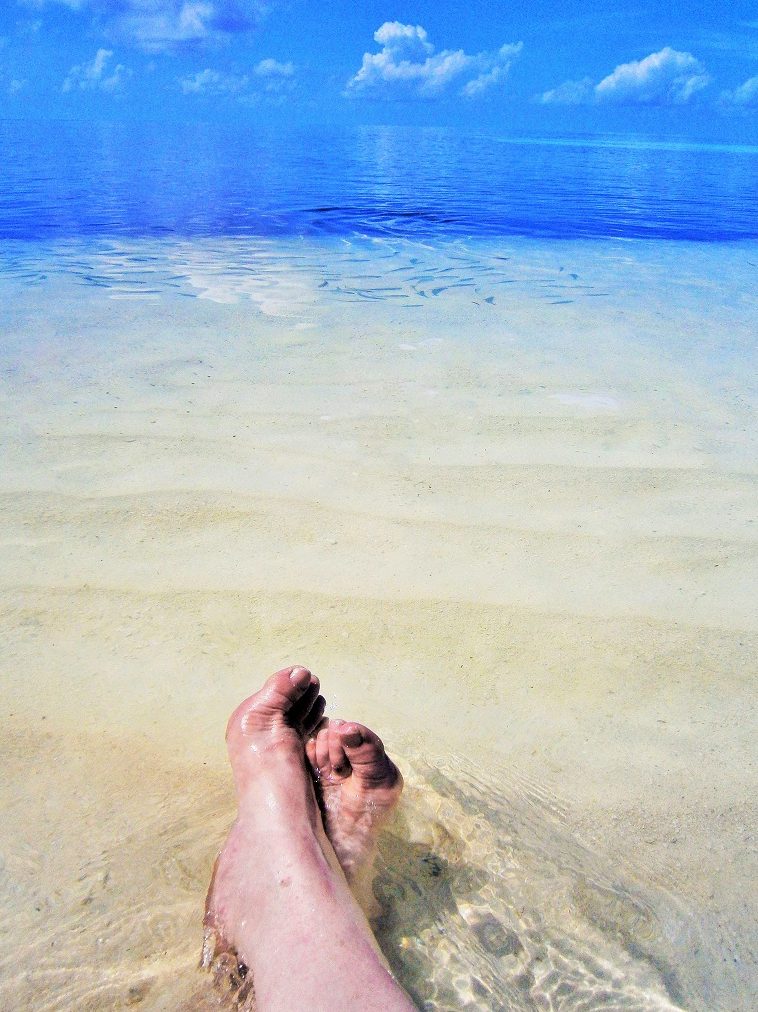Maldives! Where girls are flogged, and sometimes jailed, for being sexually abused if they cannot dig up four witnesses; on the bright side, dogs are banned so the daily road-cleaning ladies never have to wrangle dog-shit.
From research, I believe I am only the second person to write about living in the Maldives (apart from John Robinson; see end).
Virtually all books about Maldives are travel guides or photographic works of the sea-life or the 26 atolls and the 1,1900 islands.
Most tourists arrive at the airport to immediately take a speedboat or air-taxi to their resort, not realising there are nationals living on some of the islands. I have ‘surprised’ many people, over the years, by informing them of the contrast between the resort image and what life is really like for most Maldivians.
The memoir is presented in a sardonic voice but not intended to be an attack on Islam; there are ‘jokes,’ but most of them are about me.
My writing experience consists of research and reporting degrees in humanities and interpersonal communication.
I have had a range of careers including: social care, intelligence officer, sales, media monitor, and festival manager; and also been lucky to have travelled to thirty-five countries, lived in nine, and been a volunteer in four.
I lived in Maldives for three years between 2006 and 2017, I lived in Maldives (real name Dhivehi Raa’jeyge Jumhooriyya).
Living and working under my own auspices meant earning very low, local wages; years of self-funding for the pleasure of being treated like a fifth-class citizen despite recently-implemented employment regulations. I endured this ordeal to integrate with the local population, thus having a ‘real’ experience, not just a ‘touristic’ one.
The book chronicles the ghastly (and good) experiences had from living independently in the Maldives. The setting is a large rock, less than one square mile in size and home to upwards of 125,000 people. The background is the pervasive Sharia, a black market, substance misuse – the latter not surprising when there is nothing to do – virtual slavery and political upheaval. On the positive side, for some years now, many Maldivians – female and male – have been supported to study abroad to doctorate level. And now there is also a university in Maldives with more and more teachers, etc., being created each year. This relates to how the educated generation has affected opportunities for expatriates from India, Sri Lanka, Bangladesh, Nepal and the Philippines who have long relied on Maldives for employment (ironically).
In the last dozen or so years, Maldives has been in fast-forward mode; regrouping following the 2004 Tsunami, the onset of democracy in 2008, followed by the reversion to autocracy in 2012. A society can alter very quickly when the capital is the size of a toy-town. And yet one wonders: what spurs people on when most of the land is now only one metre above sea-level? It may not be well-known that the current 1,200 islands are all that remains of an ancient mountain range; ‘new’ climate change is the least of it.

Dhonis in Male’ Harbour [Jane Mauret]
I was in Maldives in 2008 when the long-term dictator, Maumoon Abdul Gayoom, was voted out and Mohamed Nasheed (k.a. Anni) was democratically elected; however, not before it was revealed the initial result was rigged to reinstall Gayoom.
In January 2012, I was about to depart Maldives when the movement to oust Anni started. About two weeks later, I was listening to the news back in New Zealand and learned he had been deposed.
In 2014 and 2017, I revisited Maldives and am planning to return later this year (2018) as I love being there and like to gather my material first-hand.
Market / Categories Memoir, Travel, Humour, Religion
I feel/hope/imagine the memoir would be of interest to people educated from at least post-high school (!) with discretionary income (!!); ‘armchair’ travellers; and those who want to read about:
- cultures and culture clash
- effect of luxury tourism on developing countries
- sociology/anthropology
- social stratification
- how even the devout have to break Sharia
- how religion affects male-female dynamics
- effects of overcrowding in modern urban settings
- nations transitioning towards democracy
- the ‘lid’ removed and truths unveiled
- psychological need for hypocrisy and self-deception
- ‘invisible’ concentration camps
- satire
- Islam

Thilafushi (Rubbish Island) Near Male’ [Daily Mail 23 June 2012]
Related Books
The Maldives: Islamic Republic, Tropical Autocracy
- by John Robinson [November 2015]
- John was the editor of an English language news outlet in Maldives called Minivan (‘Independent’). This account covers the political changes in 2008 and 2012. [Minivan recently closed down.]
Gatecrashing Paradise: Misadventure in the Real Maldives
- by Tom Chesshyre [November 2014]
- Tom goes on quirky journeys. This trip has him travelling on cargo boats for several weeks around some of the inhabited islands.

